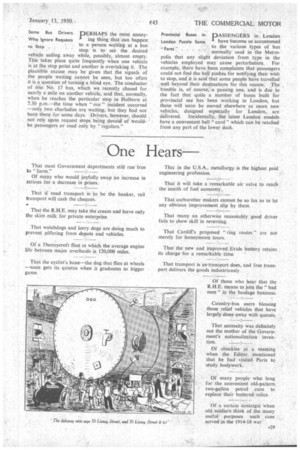One Hears
Page 31

If you've noticed an error in this article please click here to report it so we can fix it.
That most Government departments still run true to " form."
Of many who would joyfully swap an increase in rations for a decrease in prices.
That if road transport is to be the banker, rail transport will cash the cheques.
That the R.H.E. may take the cream and leave only the skim milk for private enterprise.
That watchdogs and lorry dogs are doing much to prevent pilfering from depots and vehicles.
Of a Thornycroft fleet in which the average engine life between major overhauls is 120,000 miles.
• That the cyclist's bane—the dog that flies at wheels —soon gets its quietus when it graduates to bigger game.
Thai in the U.S.A., metallurgy is the highest paid engineering profession.
That it will take a remarkable air valve to reach the zenith of fuel economy.
That carburetter makers cannot be so lax as to let any obvious improvement slip by them.
That many an otherwise reasonably good driver fails to show skill in reversing.
That Cardiff's proposed " ring routes" are not merely for honeymoon tours.
That the new and improved Exide battery retains its charge for a remarkable time. '
That transport is astransport does, and free transport delivers the goods industriously.
Of those who hear that the R.H.E. means to join the "bad men" in the haulage business.
Country-bus users blessing those relief vehicles that have largely done away with queues_ That necessity was definitely not the mother of the Government's nationalization invention.
Of chuckles at a meeting when the Editor mentioned that he had visited Paris to study bodywork.
Of many people who long for the convenient old-pattern two-gallon petrol cans to replace their battered relics.
Of a certain nostalgia when old soldiers think of the many useful purposes such cans served in the 1914-18 war.




































































































